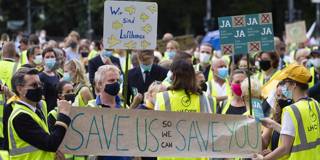With governments spending on a massive scale to save industries and mitigate the economic fallout from COVID-19, they should be positioning their economies for a more sustainable future. Fortunately, far from remaining taboo, using state aid to change private-sector behavior has become common sense.
LONDON – The COVID-19 crisis and recession provides a unique opportunity to rethink the role of the state, particularly its relationship with business. The long-held assumption that government is a burden on the market economy has been debunked. Rediscovering the state’s traditional role as an “investor of first resort” – rather than just as a lender of last resort – has become a precondition for effective policymaking in the post-COVID era.

LONDON – The COVID-19 crisis and recession provides a unique opportunity to rethink the role of the state, particularly its relationship with business. The long-held assumption that government is a burden on the market economy has been debunked. Rediscovering the state’s traditional role as an “investor of first resort” – rather than just as a lender of last resort – has become a precondition for effective policymaking in the post-COVID era.